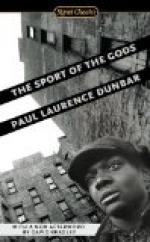“When you opened this cabinet, your money was gone?”
“Yes.”
“Were any of your papers touched?”
“No.”
“How about your jewels?”
“I have but few and they were elsewhere.”
The detective examined the room carefully, its approaches, and the hall-ways without. He paused knowingly at a window that overlooked the flat top of a porch.
“Do you ever leave this window open?”
“It is almost always so.”
“Is this porch on the front of the house?”
“No, on the side.”
“What else is out that way?”
Frank and Maurice looked at each other. The younger man hesitated and put his hand to his head. Maurice answered grimly, “My butler’s cottage is on that side and a little way back.”
“Uh huh! and your butler is, I believe, the Hamilton whom the young gentleman mentioned some time ago.”
“Yes.”
Frank’s face was really very white now. The detective nodded again.
“I think I have a clue,” he said simply. “I will be here again to-morrow morning.”
“But I shall be gone,” said Frank.
“You will hardly be needed, anyway.”
The artist gave a sigh of relief. He hated to be involved in unpleasant things. He went as far as the outer door with his brother and the detective. As he bade the officer good-night and hurried up the hall, Frank put his hand to his head again with a convulsive gesture, as if struck by a sudden pain.
“Come, come, Frank, you must take a drink now and go to bed,” said Oakley.
“I am completely unnerved.”
“I know it, and I am no less shocked than you. But we ’ve got to face it like men.”
They passed into the dining-room, where Maurice poured out some brandy for his brother and himself. “Who would have thought it?” he asked, as he tossed his own down.
“Not I. I had hoped against hope up until the last that it would turn out to be a mistake.”
“Nothing angers me so much as being deceived by the man I have helped and trusted. I should feel the sting of all this much less if the thief had come from the outside, broken in, and robbed me, but this, after all these years, is too low.”
“Don’t be hard on a man, Maurice; one never knows what prompts him to a deed. And this evidence is all circumstantial.”
“It is plain enough for me. You are entirely too kind-hearted, Frank. But I see that this thing has worn you out. You must not stand here talking. Go to bed, for you must be fresh for to-morrow morning’s journey to New York.”
Frank Oakley turned away towards his room. His face was haggard, and he staggered as he walked. His brother looked after him with a pitying and affectionate gaze.
“Poor fellow,” he said, “he is so delicately constructed that he cannot stand such shocks as these;” and then he added: “To think of that black hound’s treachery! I ’ll give him all that the law sets down for him.”




